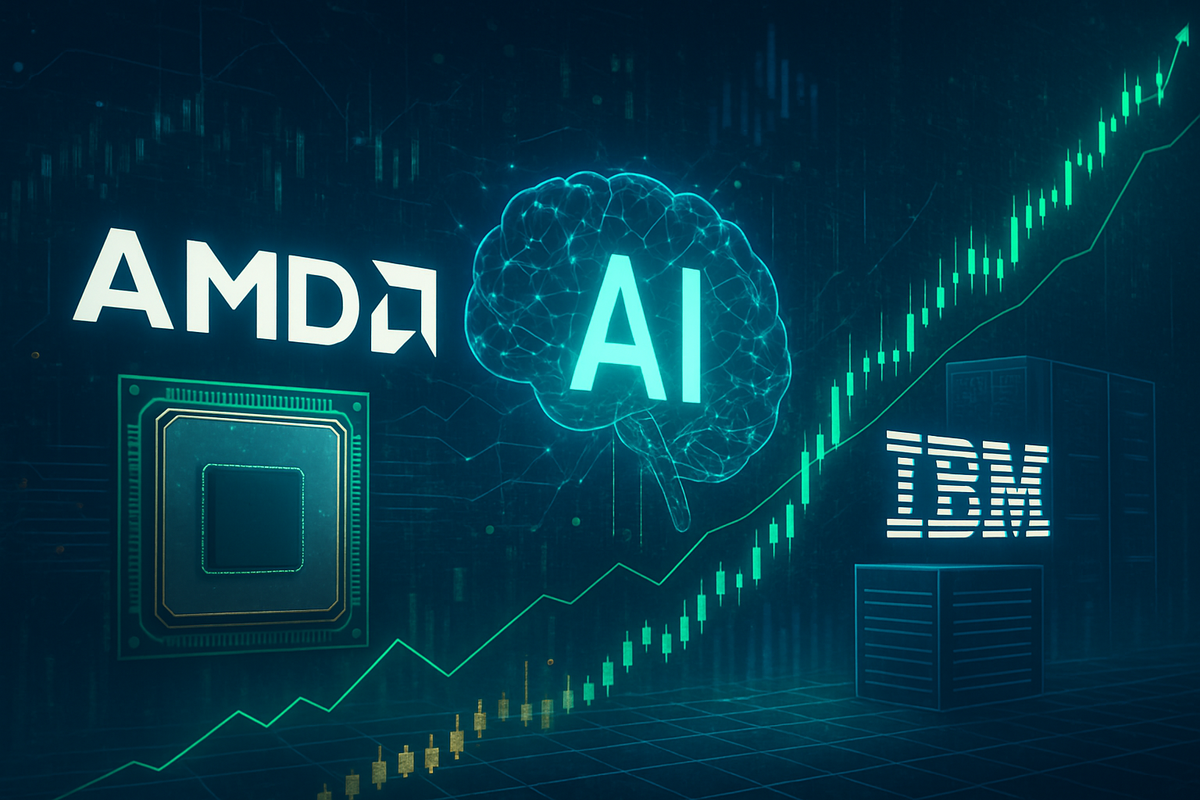
October 7, 2025 – Tuesday proved to be a pivotal day for the technology sector, as Advanced Micro Devices (NASDAQ: AMD) and International Business Machines (NYSE: IBM) emerged as leading market cap movers, propelled by significant advancements and strategic partnerships in the burgeoning artificial intelligence (AI) landscape. AMD continued its meteoric ascent following a monumental AI chip deal, while IBM saw a notable boost from expanding its enterprise AI ecosystem. These movements underscore the intense competition and rapid innovation defining the current tech market, with AI at its core.
The immediate implications of these developments signal a robust and evolving AI market, where both specialized hardware and integrated software solutions are in high demand. For AMD, the news solidifies its position as a credible challenger in the high-stakes AI accelerator market, traditionally dominated by competitors. IBM's announcements, on the other hand, reinforce its strategy of delivering comprehensive, enterprise-grade AI solutions, leveraging its hybrid cloud capabilities and expanding partner network. Investors reacted positively, reflecting confidence in the long-term growth trajectories of these tech giants in an increasingly AI-centric world.
A Deep Dive into Tuesday's Market-Shaping Events
Tuesday's market dynamism for AMD and IBM was the culmination of strategic maneuvers and sustained innovation. For Advanced Micro Devices (NASDAQ: AMD), the day saw a continuation of the previous day's euphoria. On Monday, October 6, 2025, AMD unveiled a landmark "multi-year, multi-generation" strategic partnership with OpenAI, the leading artificial intelligence research and deployment company. This transformative deal involves OpenAI deploying 6 gigawatts of AMD's powerful Instinct GPUs, starting with the MI450 series in late 2026. This announcement sent AMD shares soaring by over 30% in early trading on Monday, adding an estimated $60 billion to over $100 billion to its market capitalization and pushing the stock to a more than one-year high. On Tuesday, October 7, 2025, AMD's stock continued its upward trajectory, reflecting sustained investor confidence in the deal's long-term revenue potential and its validation of AMD's aggressive push into the lucrative AI chip market. This partnership is widely seen as a direct challenge to Nvidia's (NASDAQ: NVDA) long-standing dominance in AI hardware.
International Business Machines (NYSE: IBM) also made significant waves on Tuesday, October 7, 2025, with announcements further solidifying its commitment to enterprise AI. IBM unveiled additional advancements in software and infrastructure designed to help enterprises operationalize AI more effectively. Crucially, the company announced a strategic partnership with Anthropic, a prominent AI safety and research company, to integrate its Claude large language model into IBM's enterprise software offerings. This move expands IBM's AI ecosystem, providing its clients with more powerful and flexible tools for deploying generative AI. Following these announcements, IBM's stock added 3% on Tuesday, indicating a positive investor reaction to its expanded AI capabilities and strengthened partner network. These Tuesday developments built upon earlier collaborations, such as the October 1, 2025, announcement of a partnership between IBM, AMD, and Zyphra on next-generation AI infrastructure, leveraging integrated capabilities for AMD training clusters on IBM Cloud.
These recent events are part of a broader trend of strong performance and strategic moves by both companies throughout 2024 and 2025. AMD, for instance, reported record second-quarter 2025 revenue of $7.7 billion on August 5, 2025 (a Tuesday), driven by robust server and PC processor sales, despite facing impacts from U.S. export controls on its MI308 GPUs to China. Similarly, on February 4, 2025 (another Tuesday), AMD's Q4 2024 earnings saw earnings per share rise sharply and revenue beat estimates, primarily due to growth in its Data Center segment. IBM has also seen its stock react to earnings and AI initiatives; its Q2 2025 earnings reported on July 23, 2025, surpassed analyst expectations, with the stock rising slightly in aftermarket trading, following a 30% surge in its stock price earlier in 2025. However, not all news was positive, as IBM's stock declined significantly on April 24, 2025, despite strong Q1 2025 earnings, due to concerns over federal contract cuts. Key players in these narratives include AMD CEO Lisa Su, who has aggressively steered the company into the AI chip market, and IBM CEO Arvind Krishna, who has focused on hybrid cloud and AI as core growth drivers.
The Ripple Effect: Winners, Losers, and Market Dynamics
The recent market movements involving AMD and IBM have profound implications for various companies and market segments. Advanced Micro Devices (NASDAQ: AMD) stands as a clear winner from its OpenAI partnership. This deal not only provides a massive revenue stream but also significantly enhances AMD's credibility and market share in the high-performance computing and AI accelerator space. It positions AMD as a formidable competitor to Nvidia (NASDAQ: NVDA), which has long enjoyed a near-monopoly in AI GPUs. While Nvidia remains a dominant force, AMD's aggressive inroads, particularly with a partner as significant as OpenAI, suggest a future with more diversified supply chains and increased competition, potentially leading to innovation and price pressures. Other chipmakers like Intel (NASDAQ: INTC), which is also investing heavily in AI accelerators, will be watching closely as the competitive landscape shifts.
For International Business Machines (NYSE: IBM), the Anthropic partnership and broader AI infrastructure announcements solidify its strategy as a leading provider of enterprise AI and hybrid cloud solutions. This move strengthens IBM's position against other cloud service providers such as Amazon Web Services (NASDAQ: AMZN), Microsoft Azure (NASDAQ: MSFT), and Google Cloud (NASDAQ: GOOGL), all of whom are vying for enterprise AI workloads. By integrating advanced large language models like Claude into its software, IBM offers a compelling value proposition for businesses seeking to deploy AI responsibly and at scale. Companies specializing in AI software and services that partner with IBM could also see benefits, while those competing directly with IBM's enterprise AI offerings might face increased pressure. IBM's acquisition of HashiCorp earlier in 2025 further bolsters its hybrid cloud capabilities, creating synergies that will enhance its overall market offering.
The broader market will likely see increased investment and innovation in AI hardware and software. Companies providing infrastructure, cooling, and power solutions for massive AI data centers (like those required by the AMD-OpenAI deal) could also experience increased demand. Conversely, any company that fails to adapt to the rapid advancements in AI or cannot secure access to cutting-edge AI chips and software might find itself at a disadvantage. The emphasis on ethical AI and responsible deployment, highlighted by IBM's partnership with Anthropic, also signals a growing trend towards more regulated and trustworthy AI solutions, which could benefit companies focused on AI governance and security.
Broader Significance and Industry Trends
These significant movements by AMD and IBM are not isolated events but rather integral parts of broader, transformative industry trends. At the forefront is the escalating AI arms race, where technology companies are pouring vast resources into developing more powerful AI models, specialized hardware, and comprehensive AI platforms. The AMD-OpenAI partnership epitomizes the demand for highly specialized, energy-efficient AI accelerators capable of powering the next generation of large language models and complex AI workloads. This trend is driving unprecedented capital expenditure in data centers and semiconductor manufacturing, reshaping global supply chains.
The ripple effects of these developments extend across the entire technology ecosystem. Competitors like Nvidia (NASDAQ: NVDA) will undoubtedly accelerate their innovation cycles to maintain market leadership, potentially leading to a new wave of advanced AI chips. Intel (NASDAQ: INTC), with its Gaudi accelerators, will also intensify its efforts to capture a larger share of the AI market. Cloud providers such as Microsoft (NASDAQ: MSFT), Amazon (NASDAQ: AMZN), and Google (NASDAQ: GOOGL), who are both partners and competitors to AMD and IBM in various capacities, will continue to integrate advanced AI capabilities into their services, either through proprietary hardware or strategic collaborations. The demand for AI talent, from chip designers to AI researchers and ethical AI specialists, is also set to intensify.
Regulatory and policy implications are also becoming increasingly prominent. The U.S. government's export controls on certain high-performance AI chips, such as AMD's MI308 to China, underscore the geopolitical dimensions of the AI race. Governments worldwide are grappling with how to regulate AI, ensure ethical deployment, and manage the strategic importance of semiconductor technology. These policies can significantly impact market access, supply chain resilience, and the global competitive landscape. Historically, major technological shifts, like the rise of the internet or mobile computing, have led to similar periods of intense competition, rapid consolidation, and significant shifts in market leadership. The current AI revolution is poised to be even more profound, drawing parallels to the early days of computing or the industrial revolution in its potential to reshape economies and societies.
What Comes Next: Navigating the Future of AI and Tech
Looking ahead, the short-term and long-term possibilities for AMD, IBM, and the broader tech market are immense and multifaceted. In the short term, both companies will be focused on execution. AMD (NASDAQ: AMD) will need to demonstrate its ability to ramp up production of its Instinct GPUs to meet the massive demand from OpenAI and other clients, ensuring timely delivery and performance. The company's strategic pivot towards AI accelerators will require continued heavy investment in R&D and manufacturing capacity. For IBM (NYSE: IBM), the immediate focus will be on integrating Anthropic's Claude model seamlessly into its enterprise software and leveraging its hybrid cloud platform to deliver tangible business value to clients. Successful deployments and case studies will be crucial for reinforcing its market position.
In the long term, the landscape will likely be defined by continued innovation in AI hardware and software, intense competition, and evolving strategic alliances. AMD will aim to further erode Nvidia's market share, potentially by expanding its Instinct accelerator family and securing more high-profile partnerships. Its ability to innovate rapidly and offer competitive performance-per-watt solutions will be critical. IBM will continue to build out its comprehensive AI ecosystem, potentially through further acquisitions or partnerships, focusing on industry-specific AI solutions and responsible AI governance. The company's hybrid cloud strategy, which allows enterprises to run AI workloads across various environments, will be a key differentiator.
Market opportunities will emerge for companies specializing in AI infrastructure, data management, and cybersecurity, as the complexity and scale of AI deployments grow. Challenges will include managing the immense power consumption of AI data centers, navigating evolving regulatory frameworks, and addressing ethical concerns related to AI. Potential scenarios range from a highly consolidated AI market dominated by a few giants to a more fragmented ecosystem with specialized players carving out niche markets. Investors should watch for continued investment in AI capabilities, the emergence of new AI use cases, and the financial performance of companies heavily invested in this space. Strategic adaptations, such as diversifying supply chains and fostering open standards, will be crucial for long-term success.
Comprehensive Wrap-Up: A New Era for Tech Investment
Tuesday's market movements, spearheaded by Advanced Micro Devices (NASDAQ: AMD) and International Business Machines (NYSE: IBM), serve as a potent reminder of AI's transformative power and its central role in shaping the financial markets of 2025. The key takeaways from these events are clear: the AI arms race is intensifying, specialized hardware is in unprecedented demand, and integrated software solutions are critical for enterprise adoption. AMD's landmark partnership with OpenAI marks a significant shift in the AI accelerator market, validating its strategic investments and setting the stage for increased competition. IBM's continued expansion of its enterprise AI offerings, bolstered by partnerships like that with Anthropic, reinforces its position as a trusted provider of comprehensive, responsible AI solutions.
Moving forward, the market will likely continue to reward companies that demonstrate clear strategies and strong execution in the AI domain. The long-term significance of these events lies in their potential to accelerate technological progress, drive economic growth, and fundamentally alter industries. Investors should closely monitor several factors in the coming months: the pace of AMD's GPU production and deployment, the successful integration and adoption of IBM's new AI software offerings, the competitive responses from Nvidia and other tech giants, and any new regulatory developments impacting the AI sector. The era of AI is not just dawning; it is rapidly accelerating, creating both immense opportunities and complex challenges for companies and investors alike.
This content is intended for informational purposes only and is not financial advice





